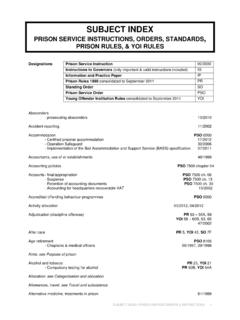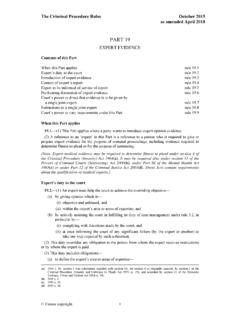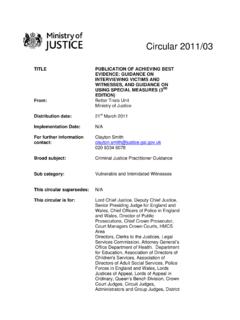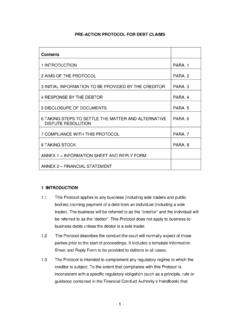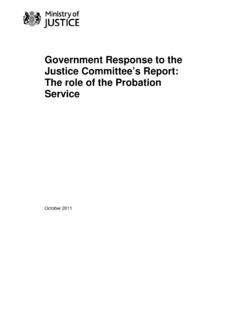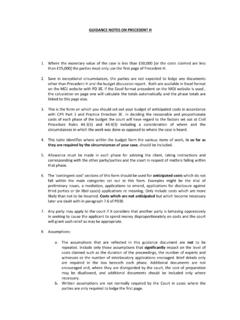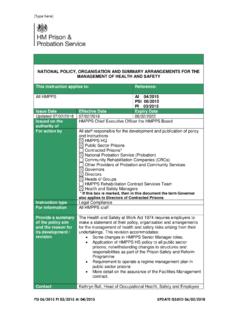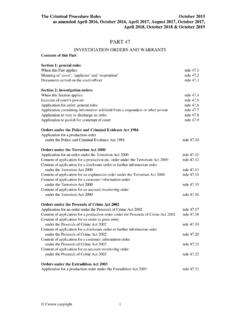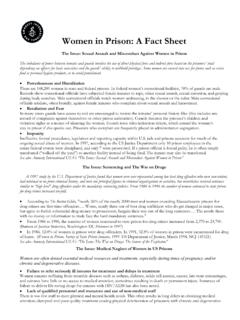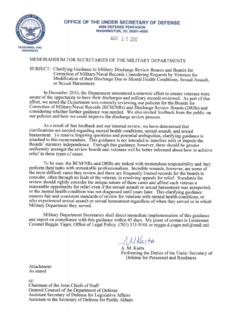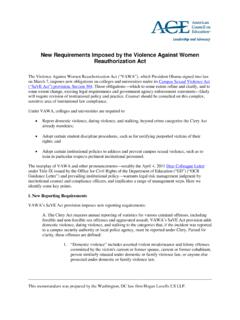Transcription of ADULT SAFEGUARDING IN PRISON - Justice
1 ADULT SAFEGUARDING IN PRISON . This instruction applies to:- Reference:- Prisons PSI 16/2015. Issue Date Effective Date Expiry Date Implementation Date 16 December 2016 1 April 2015 31 March 2019. (Re-issued). Issued on the authority NOMS Agency Board of For action by All staff responsible for the development and publication of policy and instructions NOMS HQ. NOMS Immigration Removal Centres Public Sector Prisons Contracted Prisons*. Governors * If this box is marked, then in this document the term Governor also applies to Directors of Contracted Prisons Instruction type Service improvement For information All staff in PRISON establishments and Heads of Groups, PRISON Visitors, Non-Directly Employed staff . Provide a summary of the Update December 2016 The only change to this document is the policy aim and the reason amendment made to the contact details on the front page. for its development /. revision The aim of this policy is to ensure that all ADULT prisoners (aged 18 or over) are protected from abuse and neglect.
2 It describes the processes that prisons must put in place to ensure that prisoners receive a level of protection that is equivalent to that provided to adults in the community with care and support needs who are at risk of abuse or neglect. It encourages Governors to engage with local authority SAFEGUARDING adults Boards. Contact Equality, Rights and Decency Group Associated documents Service specifications for, which can be found at: specifications Management of prisoners at risk of harm to self and others Residential services Early days and discharge - reception in PSI 15/2015 ADULT Social Care PSI 17/2015 Prisoners Assisting Other Prisoners PSI 07/2015 - PI 06/2015 Early Days in Custody PSI 42/2014 PI 60/2014 Exclusion of Personnel on Grounds of misconduct PSI 15/2014 Investigations and Learning Following Incidents of Serious Self-Harm or Serious Assaults PSI 07/2014 - AI 05/2014 - PI 03/2014 Security Vetting PSI 05/2014 SAFEGUARDING of Children and Vulnerable adults PSI 30/2013 Incentives and Earned Privileges PSI 21/2013 AI 08/2013 Reporting Wrongdoing PSI 08/2012 Care and Management of Young People PSI 04/2012 Enablers of Services Health, Library.
3 Education and Jobcentre Plus Services in Prisons in Prisons PSI 02/2012 Prisoner Complaints PSI 75/2011 Residential Services PSI 64/2011 Safer Custody PSI 49/2011 Prisoner Communication Services PSI 47/2011 PRISON Discipline Procedures PSI 32/2011 Ensuring Equality PSI 16/2011 Providing Visits and Services to Visitors PSI 15/2011 Management and Security of Visits PSI 09/2011 Cell Sharing Risk Assessment PSI 58/2010 AI 26/2010 The Prisons & Probation Ombudsman PSI 08/2010 AI 06/2010 Post Incident Care PSI 06/2010 AI 05/2010 Conduct and Discipline PSO 1300 Investigations PSO 1600 Use of Force PSO 1700 Segregation PSO 4800 Women Prisoners Care Act 2014. Care and Support Statutory Guidance Replaces the following documents which are hereby cancelled: None Audit/monitoring: Deputy Directors of Custody, Commissioners and Controllers will monitor compliance with the mandatory actions set out in this instruction. Introduces amendments to the following documents: None Notes: All Mandatory Actions throughout this instruction are in italics and must be strictly adhered to.
4 PAGE 1. CONTENTS. Hold down Ctrl' and click on section titles below to follow link Section Subject For reference by: 1 Executive Summary 2 Definitions and Responsibilities 3 Systems for Identifying and Meeting Need All PRISON staff 4 Systems for Preventing Abuse or Neglect by staff 5 Systems for Preventing Abuse or Neglect by Other Prisoners 6 Systems for Preventing Abuse or Neglect by Others 7 Protecting Particular Groups 8 Systems for Reporting Suspected Abuse or Neglect All PRISON staff and 9 Responding to Reports of Suspected Abuse or Neglect Visitors and Non- Directly Employed staff (NDE). 10 Monitoring and Analysis of SAFEGUARDING Information All PRISON staff 11 Engagement with SAFEGUARDING ADULT Boards All PRISON staff and Annex A Key ADULT SAFEGUARDING principles Visitors and Non- Directly Employed staff (NDE). Annex B SAFEGUARDING Examples All PRISON staff PSI 16/2015 UPDATE ISSUED 16/12/2016. PAGE 2. 1. Executive Summary Strategic Context This policy describes the ways in which the existing processes that operate in prisons and YOIs combine to ensure that establishments comply with their duty of care to all ADULT prisoners and young offenders aged 18 and over.
5 SAFEGUARDING responsibilities for those aged under 18 are set out in PSI 08/2012 Care and Management of Young People. It does so using the terms SAFEGUARDING ', Abuse' and Neglect'. These have not often been used in prisons, where Safer Custody' and Risk of Harm' have tended to be the language used when discussing issues of safety. This PSI defines what is meant by abuse' and neglect' and confirms that prisons have a responsibility to safeguard ADULT prisoners. In England, the Care Act 2014 places SAFEGUARDING ADULT Boards (SABs) on a statutory footing. It does not require prisons to be members, and many of the SAFEGUARDING responsibilities do not apply to prisoners. However it is important to demonstrate that, as well as ensuring compliance with our duty of care, our systems also provide a level of protection for prisoners who are unable to protect themselves as a result of having care and support needs that is equivalent to that provided in the community. This instruction therefore encourages Governors to engage with SABs, both at a strategic level and as a source of advice and assistance in SAFEGUARDING prisoners who are unable to protect themselves from abuse or neglect as a result of having care and support needs.
6 The Social Services and Well-being (Wales) 2014 Act will introduce a new structure for SAFEGUARDING Boards covering both ADULT and child SAFEGUARDING from April 2016 and further guidance for Welsh prisons will be issued to supplement this instruction. Whilst references to SABs are not relevant in Wales, all the processes described in this instruction also apply in prisons in Wales. Desired Outcomes All ADULT prisoners are protected from abuse and neglect, and prisons effectively discharge their duty of care towards them. Reported incidents of abuse and neglect are managed appropriately. This instruction does not introduce new methods of achieving these outcomes, but describes the way in which existing instructions and systems combine to do so. Application This instruction applies to all PRISON establishments in England and Wales with ADULT prisoners and / or young offenders (over 18 years old). Mandatory actions Governors and Directors of contracted prisons must ensure that all mandatory actions in this instruction are completed.
7 Governors must appoint a functional head with lead responsibility for ADULT SAFEGUARDING issues (see paragraph ). Governors must have systems in place to protect ADULT prisoners from abuse and neglect (see paragraph ). PSI 16/2015 UPDATE ISSUED 16/12/2016. PAGE 3. Governors must have systems in place for staff , prisoners and others to report suspected instances of abuse or neglect and make them aware of their responsibility to do so (see paragraph ). Governors must have systems in place to record and respond to reports of suspected instances of abuse or neglect, including protecting complainants / reporters from victimisation (see paragraph ). Governors must ensure that data is collected on all recorded suspected instances of abuse or neglect (as defined in paragraphs and ) and that analysis of this data informs actions to improve relevant practices and procedures (see paragraph ). Resource Impact This instruction describes the existing policies and systems for protecting prisoners from abuse and neglect.
8 It will not therefore have a significant direct resource impact. It mandates the appointment of an ADULT SAFEGUARDING lead and recommends that establishments engage with local SABs. In prisons in which there has not previously been an identified individual with this role and / or such engagement has not been in place in the past, this will require the investment of some limited additional resource. It is believed that this will bring benefits in terms of drawing together work on ADULT SAFEGUARDING and learning from partner organisations to improve ADULT SAFEGUARDING practice. (Signed). Digby Griffith Director of National Operational Services, NOMS. PSI 16/2015 UPDATE ISSUED 16/12/2016. PAGE 4. 2. Definition and Responsibilities ADULT SAFEGUARDING in prisons means keeping prisoners safe and protecting them from abuse and neglect. This is underpinned by six key principles set out at Annex A. PRISON staff have a common law duty of care to prisoners that includes taking appropriate action to protect them.
9 Prisons have a range of processes in place to ensure that this duty is met. These also ensure that prisoners who are unable to protect themselves as a result of care and support needs are provided with a level of protection that is equivalent to that provided in the community. Definitions of abuse and neglect are based on those used in the Care and Support Statutory Guidance issued by the Department of Health in October 2014. Abuse is any act, or failure to act, which results in a significant breach of a prisoner's human rights, civil liberties, bodily integrity, dignity or general wellbeing, whether intended or inadvertent; including sexual relationships or financial transactions to which a person has not or cannot validly consent, or which are deliberately exploitative. This may include: physical abuse including any form of assault; misuse of restraint or inappropriate physical sanctions; withholding food or drink; force-feeding; wrongly administering medicine; failing to provide physical care and aids to living.
10 Emotional or psychological abuse - including verbal abuse; threatening abandonment or harm; isolating; taking away privacy or other rights; harassment or intimidation; blaming; controlling or humiliation;. financial or material abuse - including withholding money or possessions; theft of money or property; fraud; intentionally mismanaging finances; borrowing money and not repaying; discriminatory abuse - including verbal harassment or other maltreatment due to a prisoner's protected characteristics (as defined in the Equality Act 2010 and explained in PSI 32/2011 Ensuring Equality);. institutional abuse - including the use of systems and routines which lead to neglect of a prisoner. sexual abuse - including sexual assault, rape, inappropriate touching, molesting;. pressurising a prisoner into sexual acts and non-contact sexual abuse such as indecent exposure, inappropriate looking, harassment, teasing, innuendo and simulation. Neglect is a failure to identify and meet the needs of a prisoner, for example by ignoring medical, emotional or physical care needs, failing to provide access to appropriate health, care and support or educational services or withholding of the necessities of life, such as medication, adequate nutrition and heating.
